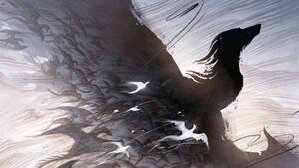Harried by pursuing shadows across foreign lands, two brown bodies pursue freedom in Maurice Broaddus’ new novella Buffalo Soldier. Bodies are important to Broaddus. They are sites of intervention by powerful interests, sites for experimentation, for militarization. One character confides in another,
“I thought he was going to beat me or … do things men with power do to people without it.”
In the novella, the protagonist, Desmond, and his charge, Lij, are on the run. Albion, an imperial power, tests nations that neighbor its imperial borders - the Tejas Free Republic and the Five Civilized Tribes – or nations that resist its colonial expansion, like Jamaica. Desmond and Lij’s tale unfurls within this larger geopolitical struggle, and their world is extremely stylized: mechanized beasts; outlandish, seemingly Victorian garb; and plenty of steam-powered technology.
The story’s primary tension is whether Desmond and Lij will make it, but I reacted to another throughline in the text: imagining what could have been. Alternate histories tend to evoke such feelings. In Buffalo Soldier, the English colonies of North America never achieved independence and are governed by Regents. There was no union for Tejas to enter, and therefore, it remains a free republic. Manifest Destiny was thwarted by savvy First Peoples who banded together and declared you shall not pass.
What if the indigenous people of North America had banded together and staked claim to the western portion of the continent? What if they created a collective of nations that evolved in dialogue, contrast, and tension with the aggression of English colonialism? Broaddus imagines that place:
“The city had a measured breath to it, as if meditating in harmony to its surroundings…The urban sprawl of squat earthen buildings trailed into the woods layered, unobtrusive, camouflaged by nature, inadvertent interruptions to the greenways. The shapes of the buildings slipped like a groove in the land, adhering to the contours of the landscape.”
Buffalo Soldier is an interesting choice for a title; it also inspires a what If. The title is obviously a reference to Bob Marley’s song of the same name, a song that begins:
“Buffalo Soldier, dreadlock Rasta
There was a Buffalo Soldier
In the heart of America
Stolen from Africa, brought to America
Fighting on arrival, fighting for survival”
The novella imbues Desmond with the sense of alienation and longing for home that characterizes Bob Marley’s song. The plot of the novella reflects oppressed people’s ever present fight for survival. The historical Buffalo Soldiers, however, were complicit in America’s genocide against Native Americans. Black soldiers gained the moniker from the Native Americans they fought against in the Indian Wars of the late 19th century. Broaddus asks, What if the black soldier fought with the Native Americans against imperial powers that seek to exterminate both of them? These what ifs are the strength of Buffalo Soldier. I enjoyed discovering, with Desmond, the urbanity of the Five Civilized Tribes – a civilization that could have been.












Cadwell Turnbull's new novel — the first in a trilogy — imagines the hard, uncertain work of a fantastical justice.